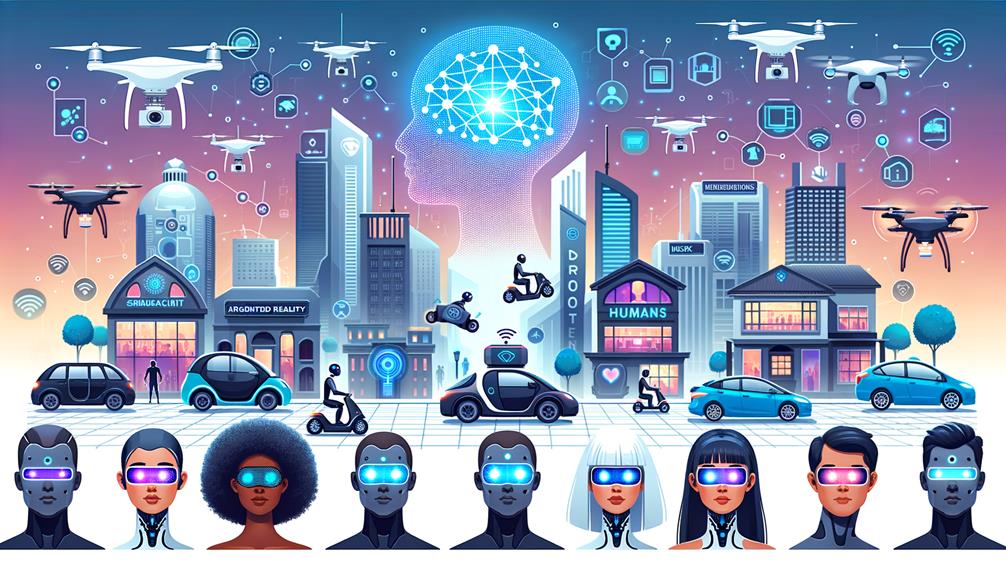Artificial Intelligence (AI) has moved beyond science fiction and research labs—it is now a part of our daily lives. From smartphones and smart homes to hospitals and businesses, AI is quietly reshaping the way we live, work, and interact. By 2025, its impact has grown so vast that it touches almost every sector of society.
This article explores how AI is transforming everyday life, highlighting real-world applications, benefits, challenges, and what the future may look like.
What Is Artificial Intelligence?
Artificial Intelligence refers to machines and software that can perform tasks typically requiring human intelligence, such as problem-solving, learning, decision-making, and creativity. Thanks to advancements in machine learning, deep learning, and natural language processing, AI has become more powerful and accessible.
AI in Daily Life: Key Areas of Transformation
1. Smartphones and Virtual Assistants
One of the most visible uses of AI is in smartphones. Features like voice recognition, predictive text, camera optimization, and AI-powered personal assistants (Siri, Alexa, Google Assistant) make phones smarter and more useful.
- Examples: Google Lens translating text in real-time, AI suggesting quick replies in emails, and voice commands controlling smart devices.
- Impact: Saves time, increases convenience, and provides personalized user experiences.
2. Smart Homes and IoT Integration
AI powers smart home devices that learn user behavior and preferences. Smart thermostats, security cameras, refrigerators, and lighting systems adapt to routines, creating energy-efficient and secure environments.
- Examples: Nest thermostat adjusting temperature automatically, Ring doorbells with AI motion detection.
- Impact: Greater comfort, improved security, and reduced energy bills.
3. Healthcare and Medical Applications
AI is revolutionizing healthcare by improving diagnosis, treatment, and patient care. AI algorithms analyze medical images, predict diseases, and assist in drug discovery at record speeds.
- Examples: AI detecting cancer earlier than doctors, wearable devices tracking vital signs, AI-powered chatbots for telemedicine.
- Impact: Saves lives through early detection, reduces healthcare costs, and expands access to medical services.
4. Education and Learning
AI in education personalizes learning by adapting content to each student’s needs. AI tutors, virtual classrooms, and intelligent grading systems are transforming how students and teachers interact.
- Examples: Duolingo’s AI-based language learning, AI analyzing student performance to suggest improvements.
- Impact: Improves learning outcomes and makes education more accessible worldwide.
5. Transportation and Autonomous Vehicles
AI plays a crucial role in self-driving cars, traffic management systems, and navigation apps. In 2025, autonomous vehicles are closer to mainstream adoption, thanks to AI-driven sensors and decision-making systems.
- Examples: Tesla Autopilot, Google’s Waymo, AI-powered ride-sharing optimization.
- Impact: Reduces human error, lowers accident rates, and creates more efficient transport systems.
6. Finance and Banking
Banks and financial institutions rely on AI for fraud detection, customer service, and investment analysis. AI chatbots assist customers 24/7, while algorithms analyze spending behavior.
- Examples: AI detecting suspicious transactions, robo-advisors managing investments.
- Impact: Safer transactions, faster customer service, and smarter financial decisions.
7. Shopping and E-commerce
AI is redefining online shopping by delivering personalized product recommendations, dynamic pricing, and customer support chatbots.
- Examples: Amazon’s AI product suggestions, AI-driven virtual try-ons for clothes.
- Impact: Increases sales for businesses, enhances shopping experiences for consumers.
8. Entertainment and Media
AI is shaping how we consume entertainment. From music streaming recommendations to AI-generated movies, artwork, and video games, AI enhances creativity and personalization.
- Examples: Netflix recommending movies, Spotify creating custom playlists, AI generating video game content.
- Impact: More engaging and personalized entertainment.
9. Work and Business Operations
AI automates repetitive tasks, freeing employees to focus on higher-level work. Businesses use AI for data analysis, HR recruitment, and customer relationship management (CRM).
- Examples: AI screening resumes, chatbots handling customer queries, AI predicting sales trends.
- Impact: Increases efficiency, lowers costs, and supports better decision-making.
10. Security and Surveillance
AI is widely used in facial recognition, threat detection, and cybersecurity. AI-driven systems can detect unusual patterns in networks or identify potential threats faster than humans.
- Examples: AI security cameras identifying intruders, cybersecurity AI blocking hacking attempts.
- Impact: Safer homes, workplaces, and online activities.
Benefits of AI in Everyday Life
- Efficiency: AI handles tasks faster than humans.
- Convenience: From online shopping to navigation, AI simplifies life.
- Personalization: Content, products, and services tailored to individual needs.
- Safety: AI enhances healthcare, transportation, and security systems.
- Innovation: Opens up new industries and opportunities.
Challenges and Ethical Concerns
Despite its benefits, AI comes with challenges:
- Job displacement: Automation may replace some human roles.
- Bias in AI: Algorithms can inherit human biases.
- Privacy risks: AI systems often collect sensitive personal data.
- Dependence on technology: Over-reliance can lead to reduced human skills.
The Future of AI in Everyday Life
By 2030, AI is expected to be even more integrated, with AI-powered cities, advanced healthcare diagnostics, and fully autonomous transportation systems. Ethical frameworks and regulations will become increasingly important to ensure responsible AI use.
Final Thoughts
Artificial Intelligence is no longer a futuristic concept—it’s part of everyday life in 2025. From smartphones and smart homes to healthcare and entertainment, AI is reshaping the way we live. While it brings challenges, its benefits are undeniable.
For businesses, investing in AI means staying competitive. For individuals, understanding AI means being prepared for the future.
SEO Tip: To maximize ranking, target long-tail keywords like “AI in daily life 2025,” “AI applications in healthcare,” and “how AI is transforming the world.” Add FAQs such as “Will AI replace jobs?” or “What are the best AI tools in 2025?” to boost visibility in search results.
